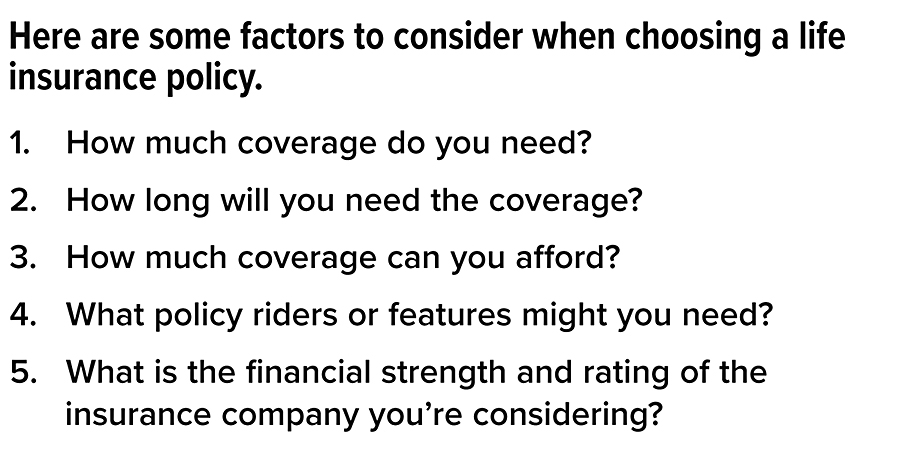Do You Have Enough Life Insurance?
Your life insurance needs change as your life changes. When you are young, you may not have a need for life insurance. However, as you take on more responsibility and your family grows, your insurance need increases but then decrease after your children are grown.
You should periodically review your life insurance coverage to ensure that it adequately reflects your life situation. Here are several methods to consider in determining your life insurance needs.
Income rule
The most basic rule of thumb is the income rule, which states that your insurance need would be equal to six or eight times your gross annual income. For example, a person earning a gross annual income of $60,000 should have between $360,000 (6 x $60,000) and $480,000 (8 x $60,000) in life insurance coverage.
Income plus expenses
This rule considers your insurance need to be equal to five times your gross annual income plus the total of any mortgage, personal debt, final expenses, and special funding needs (e.g., college). For example, assume that your gross annual income is $60,000 and your total expenses are $160,000. Your insurance need would be equal to $460,000 ($60,000 x 5 + $160,000).
Income replacement calculation
The income replacement calculation is based on the theory that the family income earners should buy enough life insurance to replace the loss of income due to an untimely death. Under this approach, the amount you should consider purchasing is based on the value of the income that you can expect to earn during your lifetime, taking into account such factors as inflation and anticipated salary increases, as well as the interest that the lump-sum life insurance proceeds will generate.
Family needs
With the family needs approach, you would purchase enough life insurance to allow your family to meet its various expenses in the event of your death. Under the family needs approach, you divide your family’s needs into three main categories:
- Immediate needs at death (cash needed for funeral and other expenses)
- Ongoing needs (income needed to maintain your family’s lifestyle)
- Special funding needs (college funding, bequests to charity and children, etc.)
Once you determine the total amount of your family’s needs, you should consider purchasing enough life insurance to cover that amount, taking into consideration the interest that the proceeds of it could earn over time.
Estate preservation and liquidity needs
This approach attempts to calculate the amount of life insurance needed upon your death to settle your estate. This method takes into consideration the amount of life insurance required to maintain the current value of your estate for your family, while potentially providing the cash needed to cover death expenses and taxes. Using this method, you should consider purchasing enough life insurance to cover potential estate taxes, along with funeral, accounting, and legal expenses associated with the administration of your estate. The life insurance may allow you to preserve the value of your estate at the level prior to your death and to help prevent an unwanted sale of assets to pay estate taxes and related expenses.
As with most financial decisions, there are expenses associated with the purchase of life insurance. Policies commonly have mortality and expense charges. In addition, if a policy is surrendered prematurely, there may be surrender charges and income tax implications. The cost and availability of life insurance depend on factors such as age, health, and the type and amount of insurance purchased.

To learn more about CapSouth and the services we provide, visit our website at https://capsouthwm.com/what-we-do/or click here to schedule a Discovery Call.



